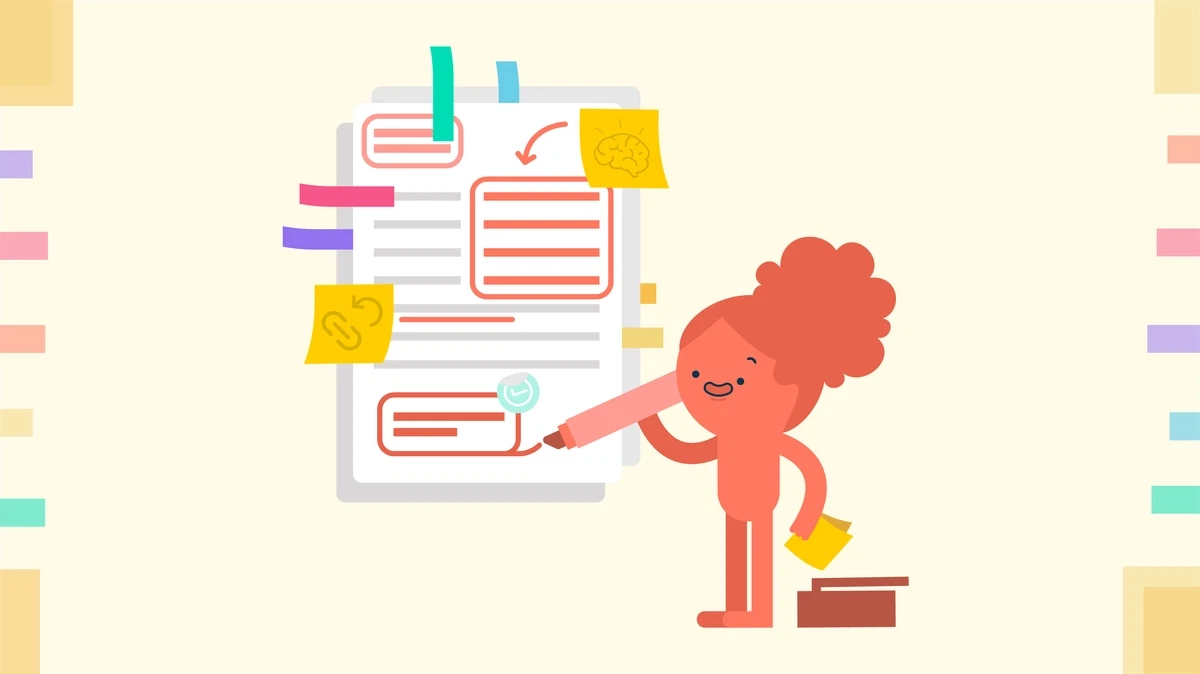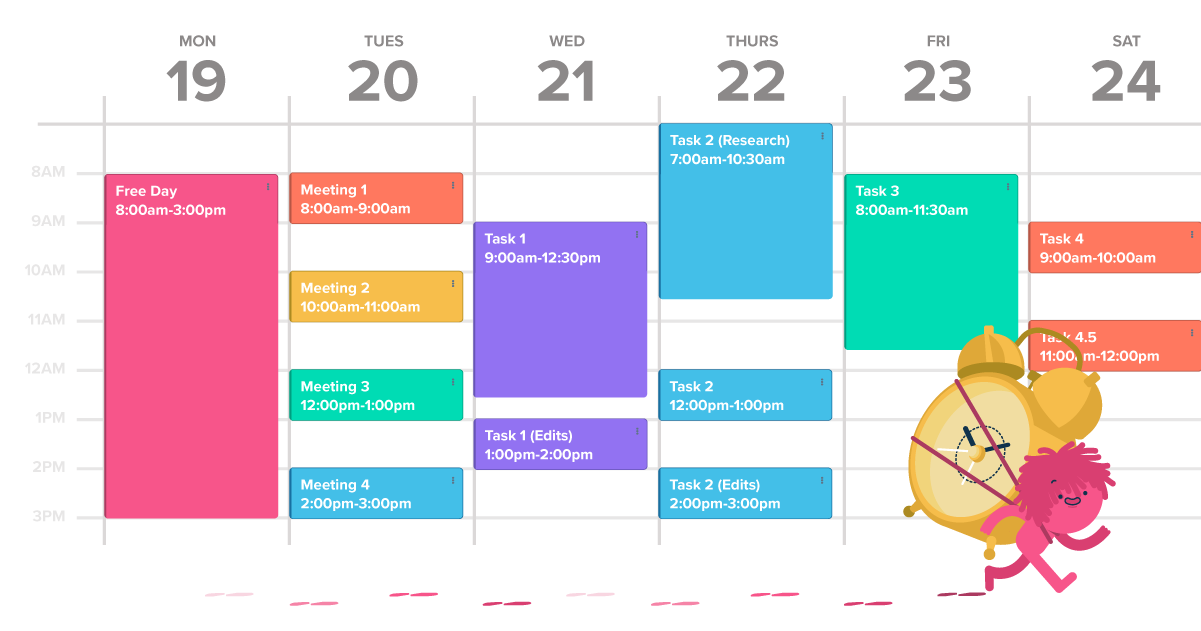Self-Management – Definition as We like It
So, what is self-management?
In heavy-handed, scientific terms, it ‘involves a person applying behavior change tactics to their own behavior to produce a desired change’ (Cooper, Heron & Heward, 2007). In simpler terms, self-management refers to any actions and practices you employ to address and change problematic behaviours. And that makes it particularly important for your studies. If you find yourself procrastinating too often, going to bed later than you would like, and going through your day without much structure, maybe it’s time to assess the problem and plan how to tackle the issue.
Elements of Self-Management
Self-management is a complex set of decisions, practices, and assessments used to regulate behaviour. Its key elements include:
- Self-awareness. This is the prerequisite for any changes you want to introduce in your behaviour. If you’re unaware of your shortcomings, you cannot change. So, instead of turning a blind eye to your bad habits, take a good, hard look at what can be improved.
- Setting goals. Realising you need to change something and setting your sights on that goal is as good a starting place as any. If you’re prone to morning snoozing, consider going to bed earlier and developing better morning habits. If you suffer from incurable procrastination in the face of certain subjects, try to rewire your brain in the way you think about those subjects and tackle them from another angle.
- Organisation. The way you organise your life and environment will determine your self-management success. If you wish to reduce sugar content in your diet, kick the sweets out of the house. If you feel sluggish after lunch and need a nap, rearrange your responsibilities in a way that would allow you to get the rest you need.
- Time management. Speaking of napping on a daily basis, how you organise your time is also important. Make sure to be reasonable with your plans and account for the time you spend doing all those lovely ‘real-life’ things like grocery shopping, cooking, and cleaning, as well as social engagements.
- Setting priorities. Don’t be too harsh on yourself – you cannot do everything at once. Decide what takes precedence and take one step at a time.
- Focus. Determination and discipline will get you further than motivation, so make sure that you stick to your decisions, whatever they may be.
Before You Build Your Self-Management Skills …
… you have to consider your strengths and weaknesses. Did I mention you have to be honest about it? We often keep ourselves in denial about our own shortcomings – either deliberately or out of sheer lack of awareness. For example, I didn’t realise that I was pulling my sleeves over my hands until it was pointed out to me; now, I’m only hyperaware of it, but oh well!
In order to manage yourself, you should take a moment and consider what is blocking your success. If you’re struggling to learn a subject, is it because of difficulties, or do you tend to sit and study only to wind up scrolling through social media? Have you promised yourself one too many times that you would get up early, but each day you find yourself looking for (and finding) excuses to stay in bed? On the flip side, you can always rely on your friends to help you out if you cannot locate the source of your problem.
Whatever ifs and buts you may be contending with, take this chance to estimate whether you’re the one standing in your own way and consider if there are some bad habits you’d like to change. You can even write a list and prioritise according to your own understanding of urgency. Once you have an idea, it’s time to make a conscious, relentless decision. Nothing’s gonna happen unless you truly apply yourself to it, so don’t be wishy-washy.
Tried and Tested Self-Management Strategies
There are many ways to manage your behaviour – from setting daily reminders on your phone and organising your time to creating a reward system. To avoid getting too lost in the semantics, I will borrow (again) from Cooper, Heron, and Heward and broadly categorise self-management strategies as:
1. Antecedent Management Strategies
These are behaviours you use before you actually engage in problematic habits. For example, you can start by downloading an app for creating good habits (I use HabitNow), which will send you reminders to do something at certain times. For instance, if you need to revise your vocabulary, you’ll get a notification on a specified day or time.
Other examples include starting a behavioural chain. You know how you sometimes start doing one thing, and then it automatically leads to a series of others that are somehow connected? For instance, checking your email, sending your assignments, and suddenly finding yourself on Instagram? Well, behavioural chains can be used as a force for good. You can teach yourself to sit at your designated study space, read your notes, and start memorising them. Create and enforce the habit for a few days, and you’ll find it becomes an automatic tendency soon.
Environmental arrangement is also a good antecedent tactic. You should organise your environment in a way that will motivate desired behaviours. If you surround yourself with books and stationery, you’re more likely to start working than if you’re sitting on the couch with your laptop, phone, and iPad around (along with crisps, biscuits, and tons of soda).
2. Consequence Strategies for Self-Management
As opposed to antecedent steps, consequence strategies are the ones you practice if you do (not) engage in desired behaviours. Use a reward system to treat yourself when you do something good and negative reinforcement to prevent bad habits from spiralling into the dredges of irreversibility. (PS All habits are reversible, but the longer you practise them, the harder it may get.)
3. Self-Management Strategies in Practice
There are ways to incorporate your self-management strategies into your daily life easily. They include self-instruction (talking yourself through a behaviour), habit by repetition (doing something as many times as possible to automatise it), or habit reversal, where you start a new habit that would contradict the bad one. For example, if you’re likely to start scrolling through social media during your study breaks, you can go for a quick walk instead.
You can set up your self-management strategies as an individual effort or get accountability buddies to keep you on the right track. To make sure you’re making progress, you should start self-monitoring. This can be done in any ‘measurable’ way – for instance, how productive you were, how many new words you remember, and how many questions you can answer in a chosen amount of time. You can perform self-monitoring checks as often or as rarely as you like, but I recommend checking in with yourself once a week.
Potluck Self-Management Skills with Examples
There are innumerable skills you can build to manage yourself. Depending on what you’re building your self-management skills for, you have unlimited options. Our potluck skillset provides a comprehensive, but certainly not definitive, list. Do what works for you and use this list as a guideline for working on your own self-management skills.
Initiative-taking. You cannot wait for others to make all decisions for you. Your life will be much more fulfilling if you take your time to do what you want to do and not wait for others’ support. If you want to travel and have no company, you should still book the flight and wave everyone goodbye for a few days.
Stress management. Student? Working too much? Writing a thesis? Dealing with household stuff? You sound like a ball of nerves bristling with electricity. Finding ways to unwind is extremely important, as is working on your own stress-management techniques – from sports and meditation to reading and niksen. Whatever calms you down is the way to go.
Healthy nutrition. There is some truth to the saying that you are what you eat. If your daily intake is mostly processed or junk food, you can’t expect to feel well and energised. Time to learn how to cook basic meals and stock your fridge with fruits and veggies.
Problem-solving. If panicking is your first response to any issue, it’s time to learn some resourcefulness. While life will throw unexpected things at you, the key to solving problems is always moving forwards and doing what’s in your power to improve the situation. If you’re the cause of trouble, apologise and correct your behaviour; if it’s something outside your control, fix what you can and let go of the rest.
Self-motivation. Same as with initiative, unless you’re a star of the movie Hercules, you cannot expect a bunch of Muses to follow you around and harmonise motivational sayings when things get difficult. You should learn to motivate yourself. If motivational quotes are your thing, write some down and have them around you at all times. If you look up to someone, print their picture and have it visible to remind you of your goals. On the other hand, if your motivation comes from within, be ready to access that place in your heart and keep moving forwards.

Gonna shout it from the mountaintops, a STAR is born!
Emotional regulation. Somehow, we’ve been conditioned to hide certain emotions and highlight others. I am of the opinion that you should always acknowledge how you feel and allow yourself to feel that way. You don’t have to be happy-go-lucky all the time, and the skies won’t always be blue, but they won’t stay grey, either. Feel what you need to feel so that you can assess why you’re feeling that way. If you refuse to accept that you’re sad, you cannot tackle the real issue behind it. If you’re afraid of public speaking, you should acknowledge it first before rationalising your emotions and overcoming them.
Interpersonal skills. Time to pick up some knowledge on emotional intelligence and learn to read the room, accept people as they are, be able to move in various circles, and navigate different social situations.
Self-confidence. Growing up and out of awkward teen years is all about learning who you are and accepting yourself. It’s also time to be proud of what you’ve achieved, get rid of limiting beliefs, and be confident that you can get what you want.
Two Steps for Your Personal Self-Management Plan
The best way to practise your self-management strategies is to develop a sustainable plan. This includes all the components of self-management: decision-making, time-management, habit reversal, and self-monitoring. However, the two most important aspects of any plan for self-improvement include:
1. What I am doing.
2. What I should do instead.
In the case of the former, you should recognise a problematic behaviour (hello, self-awareness!) and acknowledge it. The latter is your first response. When you set a goal to change a behaviour, you should always include a counteraction to reverse the bad habit. When you catch yourself engaging with the problematic action, make sure you react to it, go to your plan, and see what you should try instead. For instance, instead of skipping class, you should most definitely get up and go. Instead of playing video games every night, you should devote a decent amount of time to your studies.
Pro-Tip: Keeping a Self-Management Journal
To make your self-management plans, you could try journaling. Journaling is a great way to increase your self-awareness because you can write freely about your emotions, plans, or ideas and spot the patterns once they’re laid out on the paper. Additionally, journals are a great vessel for creativity, organisation, and time management, all of which feature heavily in the way you tackle problematic behaviours. Give it a shot; you might find it’s just the right thing for you.
A Final Note on Managing Habits
As we already explained, self-management is all about correcting behaviours you deem unfit or problematic. You can journal to keep track of your progress and divide your writing space for practising self-awareness, addressing the issues you see in your habits, and writing out a plan of action to change those habits.
Some key strategies for self-management include setting goals, prioritising, organisation and time management (this includes planning antecedent and consequence actions, which you’ll perform to counter bad habits), and dedication and focus.
Most importantly, don’t be too hard on yourself. There will be slip-ups, but self-management is a marathon, not a sprint. As long as you stay as consistent as you can, you’ll see improvement and feel all the more confident about it. Best of luck!
Sources:
Cooper, J.O., Heron, T.E. and Heward, W.L. Definition and Characteristics of Applied Behavior Analysis. 2nd Edition, Pearson, Upper Saddle River, 2007.
Self-management includes any actions or behaviours that you engage with in order to address and change some bad habits.
Some examples of self-management skills include practising self-awareness, setting goals and organising how you’ll achieve them, stress and time management, self-care, nurturing interpersonal skills, and staying dedicated to your decision.
Self-management is important for students because self-management techniques can help students develop better morning routines, fight off procrastination, and find motivation when it is lacking.
How we ensure our content is accurate and trustworthy?
At StudySmarter, we have created a learning platform that serves millions of students. Meet the people who work hard to deliver fact based content as well as making sure it is verified.

Gabriel Freitas is an AI Engineer with a solid experience in software development, machine learning algorithms, and generative AI, including large language models’ (LLMs) applications. Graduated in Electrical Engineering at the University of São Paulo, he is currently pursuing an MSc in Computer Engineering at the University of Campinas, specializing in machine learning topics. Gabriel has a strong background in software engineering and has worked on projects involving computer vision, embedded AI, and LLM applications.
Get to know Gabriel




